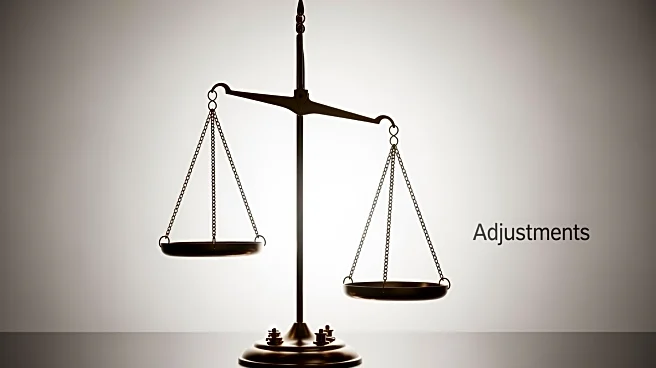What's Happening?
Federal Reserve Governor Stephen Miran has expressed concerns over the current level of short-term interest rates, suggesting they are too restrictive and pose risks to the U.S. economy. In an interview with Yahoo Finance, Miran highlighted that the policy
is far above neutral rates, which could lead to unnecessary economic risks. He indicated that, unless unexpected developments occur, a rate cut in December would be sensible. Miran's comments come amid a lack of official economic data due to the ongoing government shutdown, which has complicated the Federal Reserve's decision-making process. Despite the uncertainty, Miran remains inclined towards a rate cut, contrasting with Federal Reserve Chair Jerome Powell's caution against assuming a December cut is guaranteed.
Why It's Important?
Miran's advocacy for rate cuts underscores a significant debate within the Federal Reserve regarding the appropriate monetary policy stance. The restrictive rates could potentially slow economic growth, affecting businesses and consumers. A rate cut could stimulate economic activity by lowering borrowing costs, benefiting sectors such as housing and consumer spending. However, it also raises concerns about inflation and the Federal Reserve's ability to manage economic stability. The decision on interest rates will have broad implications for financial markets, influencing investment strategies and economic forecasts.
What's Next?
The Federal Reserve's upcoming decisions will be closely watched by market participants and policymakers. Miran's stance suggests potential shifts in monetary policy, contingent on economic data and developments. The Supreme Court's consideration of President Trump's tariff regime adds another layer of uncertainty, as changes in trade policy could impact economic conditions. Stakeholders, including businesses and investors, will need to navigate these uncertainties as they plan for the future.
Beyond the Headlines
The debate over interest rates highlights broader economic challenges, including balancing growth and inflation. The Federal Reserve's decisions will reflect its assessment of economic conditions and its commitment to maintaining stability. The ongoing government shutdown complicates this task, as the lack of official data limits the Fed's ability to make informed decisions. The situation underscores the importance of reliable economic indicators and the challenges of policymaking in uncertain times.

















